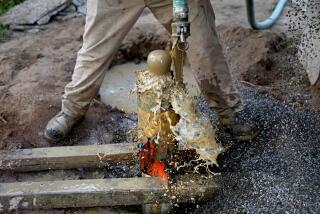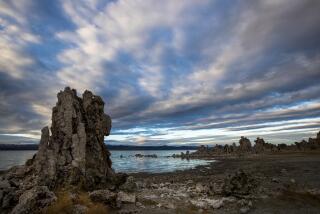Readers React: Climate change threatens Mono Lake. Trying to refill it with water we don’t have won’t work
To the editor: Mono Lake, Owens Lake and the Salton Sea require ever-increasing volumes of water from dwindling sources to prevent dust from fouling the air. That is not a workable long-term solution.
Instead of pumping water onto areas of fine-dust particles or not diverting the streams that feed the shrinking lakes, the responsible government agencies should cover selected areas with gravel to prevent the dust from kicking up. Then, build solar farms over the gravel and use the energy and revenue generated to provide for smaller, higher-quality water habitats.
Steve Robinson, Silver Lake
..
To the editor: It is amazing to me how many projects to build thousands of homes in California receive vocal support from politicians. Each time I read of such a project, I ask from where the water for the new residents will come.
I haven’t come across a good answer. I’d also like to know about traffic mitigation.
The article on the shrinking Mono Lake, whose water supply is threatened by climate change and diversions by the Los Angeles Department of Water and Power, confirms my concerns. Is there anyone who can give the public answers before more of these housing projects get approved?
Nancy White, Burbank
..
To the editor: Your article on the air pollution problems posed by dust storms over Mono Lake defines the issue clearly but with one glaring omission: You make no mention of the crucial role of the Mono Lake Committee.
In fact, it was the Mono Lake Committee that first caused the State Water Resources Control Board in 1994 to require the DWP to cap its withdrawals from the streams feeding the lake and thereby allow the lake level to rise to 6,392 feet above sea level by 2020.
The Mono Lake Committee continues to closely monitor the DWP operations and constitutes a major force for ensuing the entire surrounding area be well-maintained and ready to deal with changing climate conditions.
Chris Holabird, Los Angeles
Follow the Opinion section on Twitter @latimesopinion and Facebook
More to Read
A cure for the common opinion
Get thought-provoking perspectives with our weekly newsletter.
You may occasionally receive promotional content from the Los Angeles Times.










